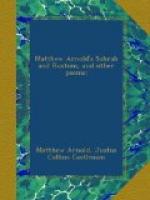=120. Khiva.= A khanate situated
in the valley of the lower Oxus, bordering Bokhara
on the southeast. =ferment the milk of mares.= An
intoxicating drink, Koumiss, made of camel’s
or mare’s milk, is in wide use among the steppe
tribes.
[158]
=121. Toorkmuns.= A branch of the Turkish race
found chiefly in northern Persia and Afghanistan.
=122. Tukas.= From the province of Azer-baijan.
=123. Attruck.= A river of Khorassan, near the frontier of Khiva; it has a west course, and enters the Caspian Sea on the east side.
=128. Ferghana.= A khanate of Turkestan, north of Bokhara, in the upper valley of the Sir Daria.
=129. Jaxartes.= The ancient name of the Sir Daria River. It takes its source in the Thian Shan Mountains, one of the Pamir Plateau ranges, and flows with a general direction north, emptying into the Aral Sea on the east side.
=131. Kipchak.= A khanate some seventy miles below Khiva on the Oxus.
=132. Kalmucks.= A nomadic branch of the Mongolian race, dwelling in western Siberia. =Kuzzaks.= Now commonly called Cossacks; a warlike people inhabiting the steppes of southern Russia and extensive portions of Asia. Their origin is uncertain.
=133. Kirghizzes.= A rude nomadic people of Mongolian-Tartar race found in northern Turkestan.
=138. Khorassan.= (That is, the region of the
sun.) A province of northeastern Persia, largely desert.
The origin of the name is
prettily suggested by Moore in the opening
poem of Lalla Rookh:—
“In the delightful
province of the sun
The first of Persian lands he shines upon,”
etc.
=147. fix’d.= Stopped suddenly, halted.
=154-169.= Note the effect the challenge has on the two armies.
=156. corn.= Here used with its European
sense of “grain.” It is only in America
that the word signifies Indian corn or “maize.”
[159]
=160. Cabool.= Capital of northern Afghanistan,
and an important commercial city.
=161. Indian Caucasus.= A lofty mountain range north of Cabool, which forms the boundary between Turkestan and Afghanistan.
=173. King.= See note, l. 85.
=177. lion’s heart.= Explain the line. Why are the terms here used so forcible in the mouth of Gudurz?
=178-183. Aloof he sits, etc.= One is reminded by Rustum’s deportment here, of Achilles sulking in his tent and nursing his wrath against Agamemnon.—Iliad, Book I.
=199. sate.= Old form of “sat,” common in poetry.
=200. falcon.= A kind of hawk trained to catch game birds.
=217. Iran.= The official name of Persia.
=221. Go to!= Hebraic expression. Frequently found in Shakespeare.
=223. Kai Khosroo.= According to the Shah Nameh, the thirteenth Turanian king. He reigned in the sixth century B.C., and has been identified with Cyrus the Great.




